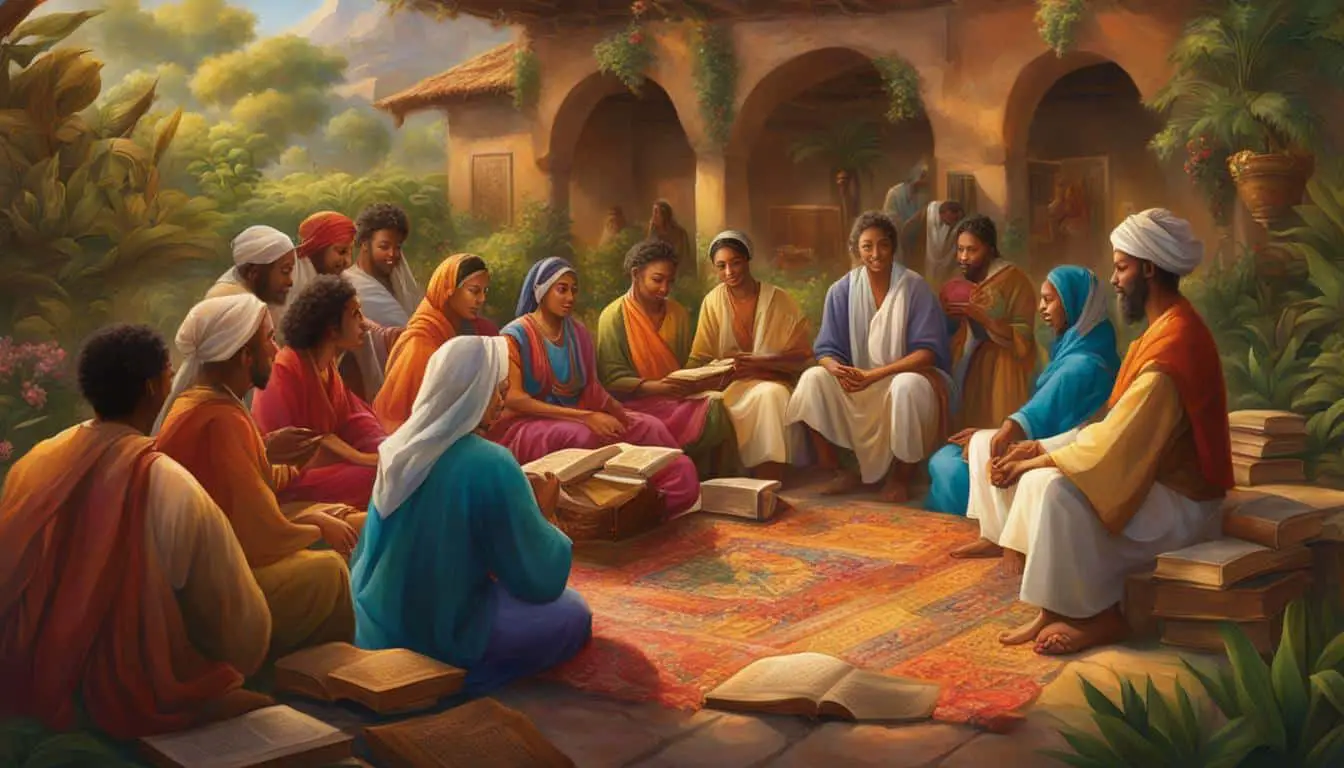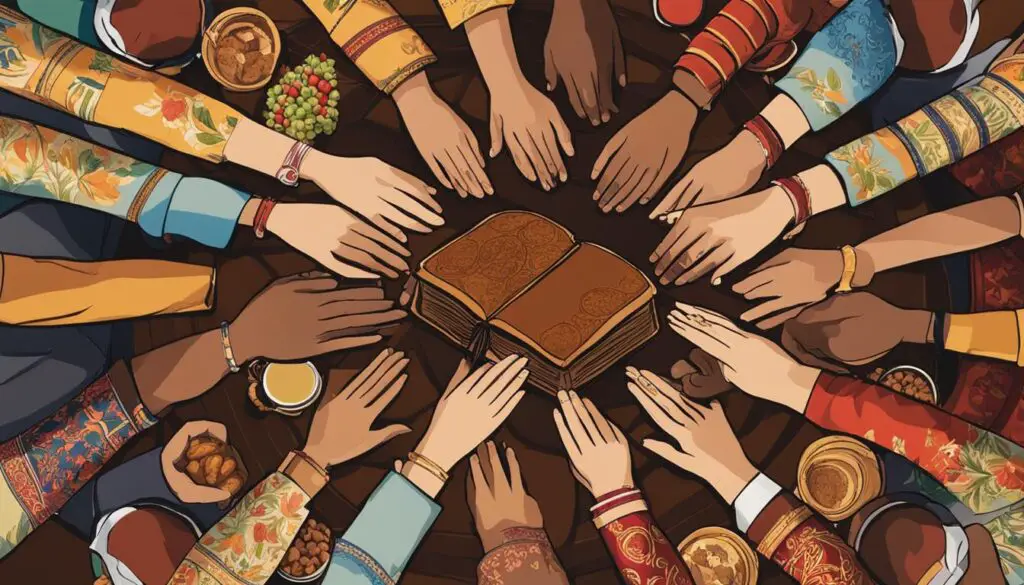
Exploring Cultural Diversity in Biblical Accounts
The Bible’s depiction of cultural diversity offers a nuanced perspective on the representation of different cultures in its narratives. Contrary to popular belief, the biblical accounts go beyond featuring characters who resemble modern-day Europeans. Instead, they embrace multicultural perspectives and emphasize the significance of ethnic diversity within their stories.
Key Takeaways:
- The Bible portrays a diverse range of ethnic backgrounds, challenging common assumptions.
- Characters like Abraham and the Cushites highlight the multicultural nature of the biblical world.
- The New Testament emphasizes the unity of believers, regardless of ethnic background.
- Cultural diversity in the Bible serves a theological purpose, reflecting God’s plan for humanity.
- The church plays a crucial role in reconciling cultural identity with God’s plan.
The Theological Significance of Cultural Diversity in Scripture
The Bible teaches that all people are created in the image of God, regardless of their race or ethnicity. This foundational truth emphasizes the inherent worth and dignity of every individual, regardless of their cultural background. By recognizing God’s image in all races and ethnicities, we acknowledge the beauty of diversity that reflects the richness of God’s creation.
“So God created mankind in his own image, in the image of God he created them; male and female he created them.” – Genesis 1:27
Throughout the biblical narrative, we see the theological significance of cultural diversity in action. In the context of ancient Israel, we find a vibrant tapestry of ethnic backgrounds. Abraham, the father of many nations, had a mixed heritage, marrying Canaanites and Egyptians. The inclusion of Black Africans, particularly the Cushites, also plays a significant role in God’s plan of redemption.
The Old Testament mentions the Cushites over 50 times, highlighting their active participation in the geopolitics and economics of the ancient Near East. They were a key ethnic group in God’s redemptive purposes, challenging any notions of racial superiority or exclusivity. In the New Testament, the Ethiopian Eunuch serves as a powerful symbol of the inclusion of Gentiles in God’s kingdom, further affirming the theological significance of cultural diversity.
This biblical framework calls us to embrace and celebrate cultural diversity, recognizing that it is an essential part of God’s design for humanity. By upholding the value and dignity of every culture, we can foster greater unity and understanding among different racial and ethnic groups, contributing to God’s purposes for the world.

Theological Significance of Cultural Diversity in Scripture
| Scripture | Cultural Diversity | Theological Meaning |
|---|---|---|
| Genesis 1:27 | All people created in God’s image | Reflection of God’s diversity in humanity |
| Genesis 12:1-3 | Abraham’s multi-ethnic family | God’s plan to bless all nations |
| Numbers 12:1-15 | Moses’ Cushite wife | Acceptance of interracial marriage |
| Acts 8:26-40 | The Ethiopian Eunuch | Inclusion of Gentiles in God’s kingdom |
Reconciling Cultural Identity with God’s Plan
The church serves as a diverse community where individuals from various cultural backgrounds can come together to worship God and seek unity. It is essential to recognize that cultural diversity should not lead to assimilation or the abandonment of one’s cultural identity. Instead, the church should create an inclusive environment that values and embraces the unique gifts, perspectives, and traditions of its members.
However, in this pursuit of unity within diversity, it is crucial to address systemic racism and its impact on cultural identity. Systemic racism distorts the beauty of cultural diversity by perpetuating divisions and inequalities based on race. As Christians, we are called to actively combat systemic racism, promote racial reconciliation, and advocate for justice and equality for all.
“The church has a responsibility to actively combat systemic racism and promote racial reconciliation.”
The role of identity politics should also be carefully considered in the context of cultural diversity within the church. While cultural identity is an essential aspect of who we are, our primary identity as Christians is in Christ. It is through our shared faith in Christ that we are united as brothers and sisters in the body of Christ.
Therefore, as we navigate the complexities of cultural identity, we should celebrate and integrate cultural diversity within the church while recognizing that our ultimate allegiance is to Christ. By fostering a community that values and respects cultural diversity, the church can contribute to God’s purposes for humanity and be a shining example of unity amidst diversity.

| Role of the Church | Challenges to Address | Approach |
|---|---|---|
| Promoting cultural integration | Assimilation and abandonment of cultural identity | Create an inclusive environment that values and embraces diverse cultural backgrounds |
| Combatting systemic racism | Divisions and inequalities based on race | Actively advocate for justice, equality, and racial reconciliation |
| Navigating identity politics | Conflicting loyalties and potential divisions | Recognize our primary identity in Christ while celebrating and integrating cultural diversity |
Embracing Cultural Diversity as God’s Design
Cultural diversity is not a result of sin but is part of God’s design for humanity. The Bible presents a vision of unity in diversity, where people from every tribe, language, and nation come together to worship God.
In the new creation, cultural diversity will be celebrated and expressed in perfect unity. God’s design for cultural diversity is a reflection of the richness of his creation and the beauty of his image in all people.
As Christians, we have the opportunity to embrace and celebrate cultural diversity, recognizing that it is a vital aspect of God’s plan. By valuing and respecting each other’s cultural backgrounds, we can contribute to the biblical vision of unity in diversity.
Let us remember that cultural diversity in the new creation is a testament to God’s creativity and love for all people. As we embrace the beauty of diversity, we can actively participate in God’s purposes for humanity and promote unity among believers.
FAQ
Does the Bible feature characters from different ethnic backgrounds?
Yes, the Bible’s storyline reflects a significant amount of ethnic diversity. Characters from various ethnic backgrounds, such as Arameans, Amorites, Canaanites, Egyptians, and Black Africans (Cushites), play important roles throughout the biblical narratives.
How does the Bible emphasize the unity of believers regardless of their ethnic background?
The New Testament highlights the unity of all believers in Christ, emphasizing that our primary identity as Christians is in Him. The book of Revelation provides a glimpse of a multi-ethnic congregation in the new creation, affirming the importance of ethnic diversity in God’s plan.
What does the Bible teach about the value of all races and ethnicities?
The Bible teaches that all people are created in the image of God, regardless of their race or ethnicity. This truth has profound implications for how we view and treat people from different races and ethnicities.
How should the church approach cultural diversity?
The church should create a community where individuals from diverse cultures can integrate and contribute their unique gifts and perspectives. It should celebrate and value cultural diversity while recognizing that our primary identity as Christians is in Christ.
What is the church’s responsibility regarding systemic racism?
The church has a responsibility to actively combat systemic racism and promote racial reconciliation. Systemic racism distorts the beauty of cultural diversity by creating divisions and inequalities based on race.
Does cultural diversity reflect God’s design for humanity?
Yes, cultural diversity is part of God’s design for humanity. The Bible presents a vision of unity in diversity, where people from every tribe, language, and nation come together to worship God. In the new creation, cultural diversity will be celebrated and expressed in perfect unity.
How can we embrace cultural diversity in line with God’s plan?
By valuing and respecting cultural diversity, we can promote unity and contribute to God’s purposes for humanity. Embracing cultural diversity recognizes the richness of God’s creation and the beauty of His image in all people.
